代词热点扫描[下学期]
图片预览
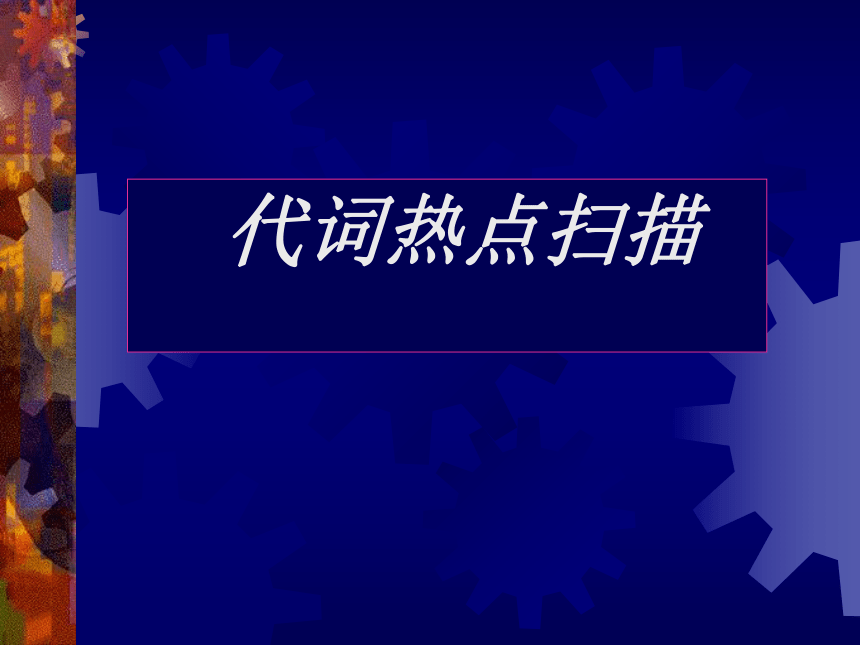
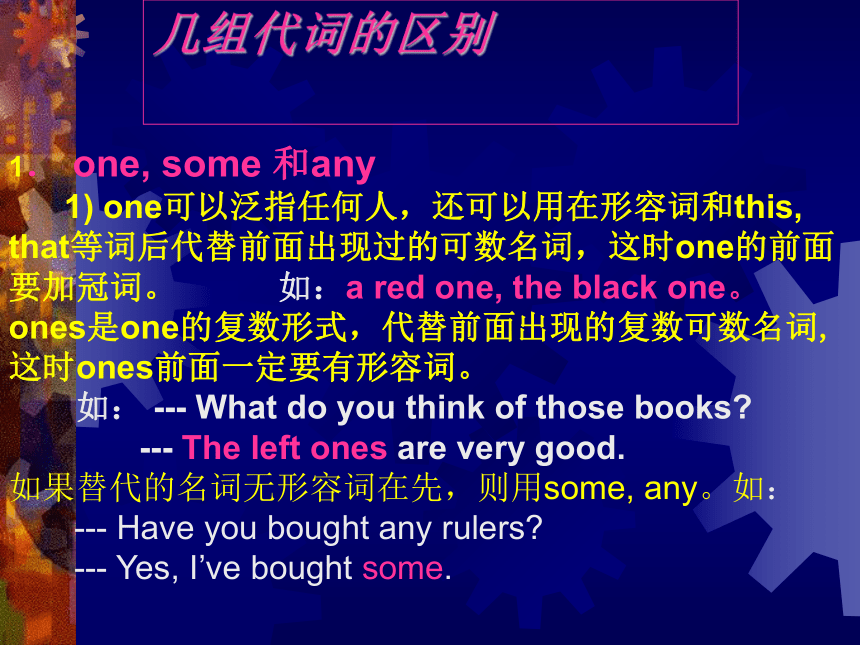

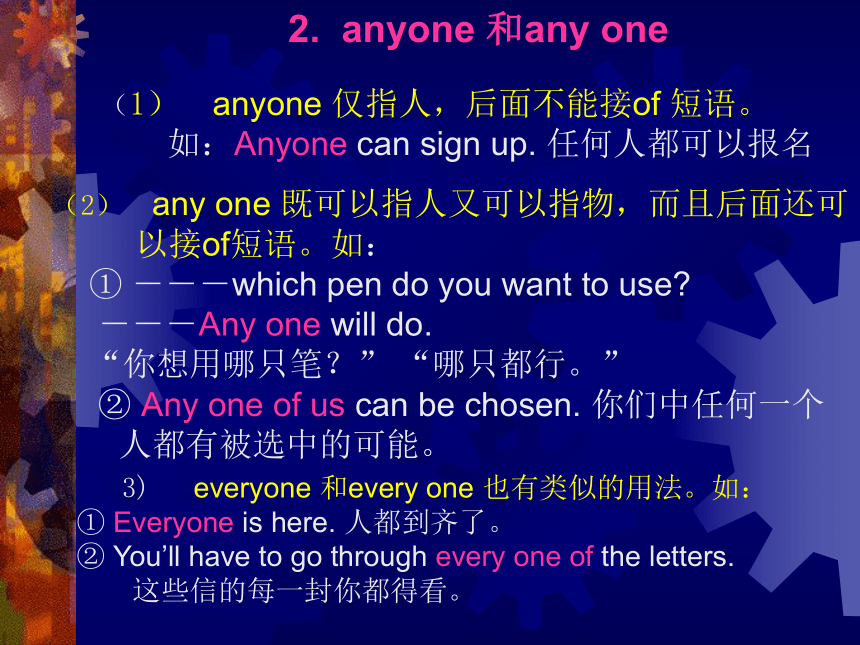
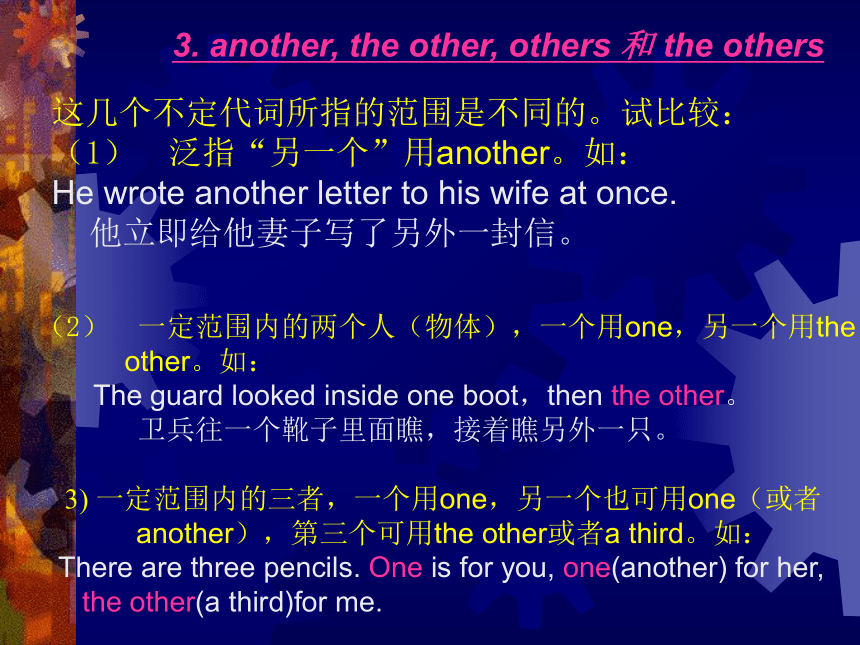
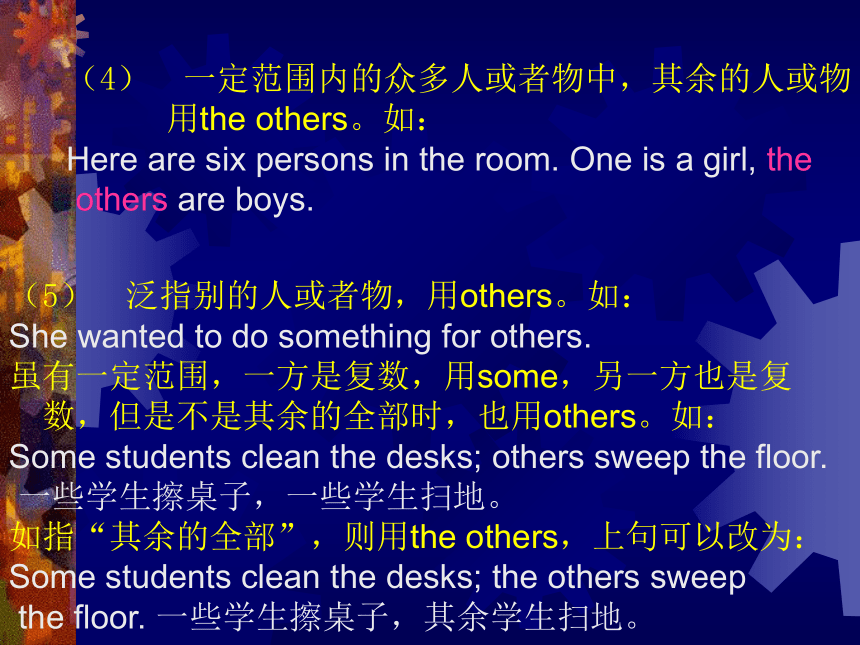
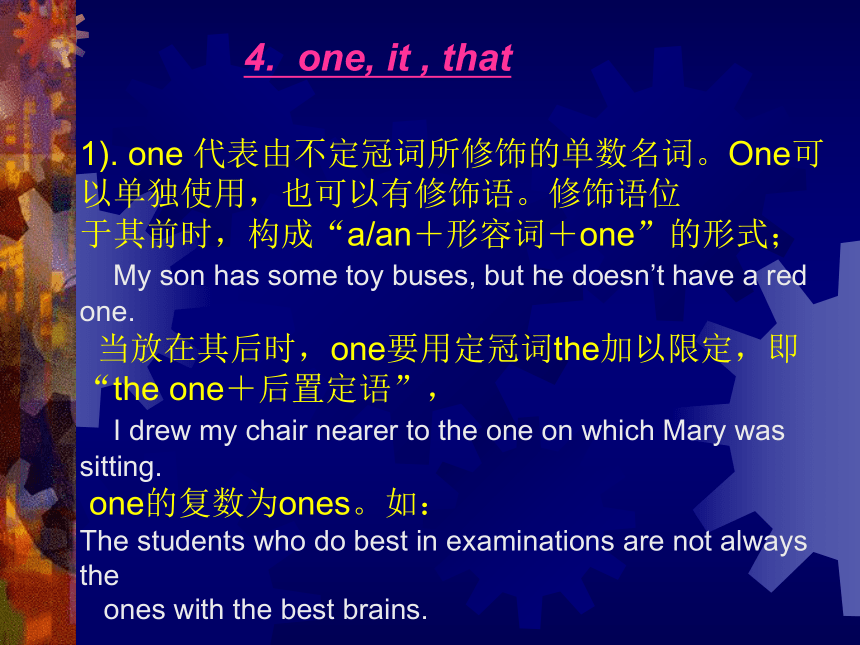
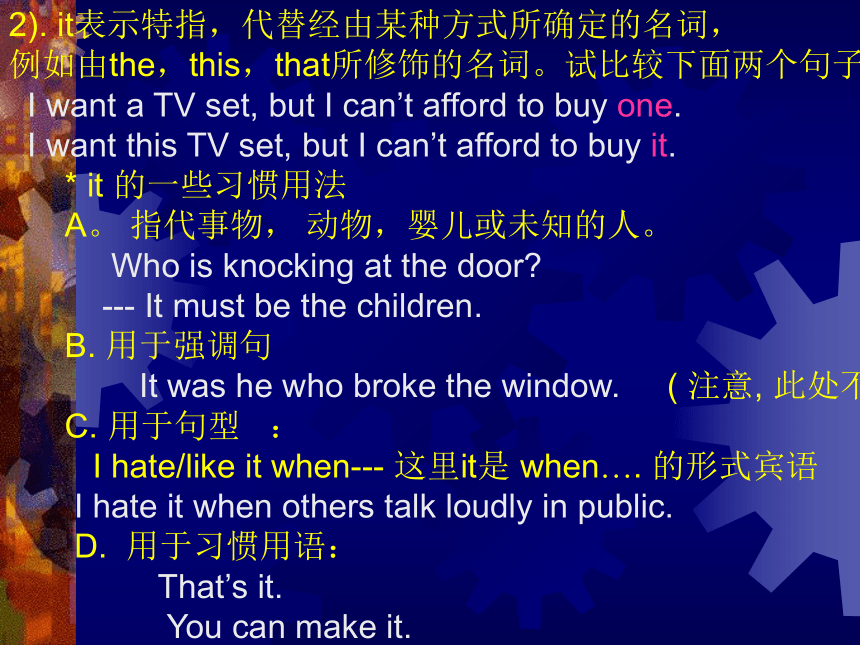
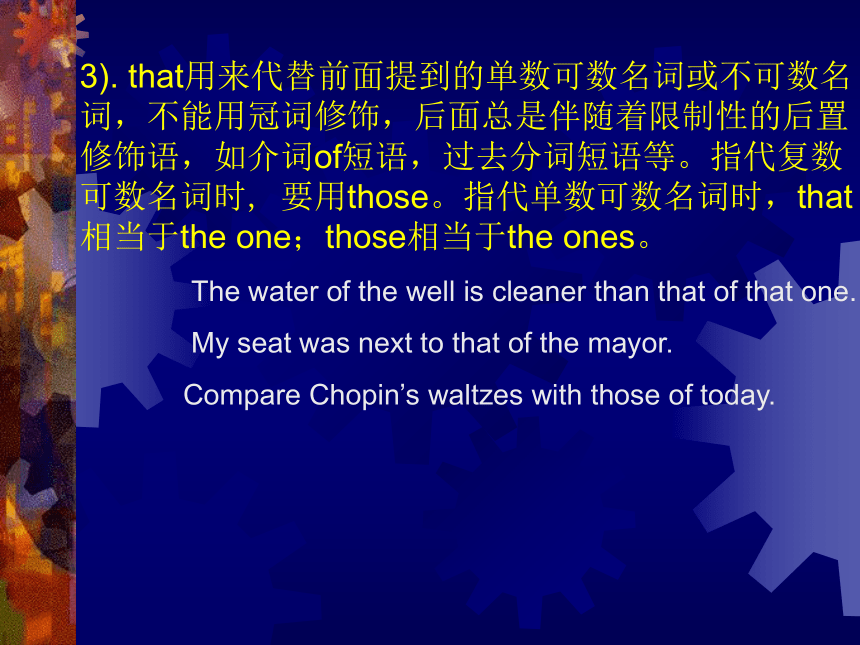
文档简介
课件21张PPT。 代词热点扫描
?
几组代词的区别
1. one, some 和any
1) one可以泛指任何人,还可以用在形容词和this, that等词后代替前面出现过的可数名词,这时one的前面要加冠词。 如:a red one, the black one。
ones是one的复数形式,代替前面出现的复数可数名词,这时ones前面一定要有形容词。
如: --- What do you think of those books?
--- The left ones are very good.
如果替代的名词无形容词在先,则用some, any。如:
--- Have you bought any rulers?
--- Yes, I’ve bought some.
2)???? some与复数名词及不可数名词连用;也可与单数名词
连用,当作“某一”解释,相当于a certain。 如:
I need some books while she needs some perfume.
You will be sorry for this some day.
A certain (Some) person has seen you break the rule.注意: some用于其他句式中:
肯定疑问句中:说话人认为对方的答案会是肯定的,或期望得到肯定回答时。如:
Would you like some coffee?
b.在条件状语从句中表示确定的意义时。如:
If you need some help, let me know.
c. some位于主语部分。如:
Some haven’t been there before. d. 当否定的是整体中的部分时, some可用于否定句。如:
I haven’t heard from some of my old friends these years. 2. anyone 和any one
(1)??? anyone 仅指人,后面不能接of 短语。
如:Anyone can sign up. 任何人都可以报名(2)??? any one 既可以指人又可以指物,而且后面还可
以接of短语。如:
① ―――which pen do you want to use?
―――Any one will do.
“你想用哪只笔?” “哪只都行。”
② Any one of us can be chosen. 你们中任何一个
人都有被选中的可能。 3) ??? everyone 和every one 也有类似的用法。如:
① Everyone is here. 人都到齐了。
② You’ll have to go through every one of the letters.
这些信的每一封你都得看。
3. another, the other, others 和 the others
这几个不定代词所指的范围是不同的。试比较:
(1)??? 泛指“另一个”用another。如:
He wrote another letter to his wife at once.
他立即给他妻子写了另外一封信。
(2)??? 一定范围内的两个人(物体),一个用one,另一个用the
other。如:
The guard looked inside one boot,then the other。
卫兵往一个靴子里面瞧,接着瞧另外一只。 ??3) 一定范围内的三者,一个用one,另一个也可用one(或者
another),第三个可用the other或者a third。如:
There are three pencils. One is for you, one(another) for her,
the other(a third)for me. (4)??? 一定范围内的众多人或者物中,其余的人或物
用the others。如:
Here are six persons in the room. One is a girl, the
others are boys. (5)??? 泛指别的人或者物,用others。如:
She wanted to do something for others.
虽有一定范围,一方是复数,用some,另一方也是复
数,但是不是其余的全部时,也用others。如:
Some students clean the desks; others sweep the floor.
一些学生擦桌子,一些学生扫地。
如指“其余的全部”,则用the others,上句可以改为:
Some students clean the desks; the others sweep
the floor. 一些学生擦桌子,其余学生扫地。 4. one, it , that 1). one 代表由不定冠词所修饰的单数名词。One可以单独使用,也可以有修饰语。修饰语位
于其前时,构成“a/an+形容词+one”的形式;
My son has some toy buses, but he doesn’t have a red one.
当放在其后时,one要用定冠词the加以限定,即
“the one+后置定语”,
I drew my chair nearer to the one on which Mary was sitting.
one的复数为ones。如:
The students who do best in examinations are not always the
ones with the best brains. 2). it表示特指,代替经由某种方式所确定的名词,
例如由the,this,that所修饰的名词。试比较下面两个句子:
I want a TV set, but I can’t afford to buy one.
I want this TV set, but I can’t afford to buy it.
* it 的一些习惯用法
A。 指代事物, 动物,婴儿或未知的人。
Who is knocking at the door?
--- It must be the children.
B. 用于强调句
It was he who broke the window. ( 注意, 此处不能用him)
C. 用于句型 :
I hate/like it when--- 这里it是 when…. 的形式宾语
I hate it when others talk loudly in public.
D. 用于习惯用语:
That’s it.
You can make it.
3). that用来代替前面提到的单数可数名词或不可数名词,不能用冠词修饰,后面总是伴随着限制性的后置修饰语,如介词of短语,过去分词短语等。指代复数可数名词时, 要用those。指代单数可数名词时,that相当于the one;those相当于the ones。
The water of the well is cleaner than that of that one.
My seat was next to that of the mayor.
Compare Chopin’s waltzes with those of today.
5. all和both的用法 这两个词都表示整体,但both指两个人或物,而all
指三个以上的人或物;在句中都可作主语,宾语,表语,
同位语和定语。如
All of us should work hard.. (作主语) 2) Both和all加否定是部分否定,如果要表示全部否定,
分别用neither和none。例如:
Both of us are not teachers. 我们俩不都是老师。(部分否定)
Neither of us is a teacher. 我们俩都不是老师。(全部否定)
All of the books are not English books. 这些书不都是英语书。
(部分否定)
None of the books are English books. 所有的书都不是英语书。
(全部否定) ?
6. Few, little; a few, a little的用法 few和little表示没有多少,含否定意义;而a few和a little
表示有一些,有几个,含肯定意义。另外,few与a few修饰
可数名词;little修饰不可数名词。他们在句中常用作定语、
主语和宾语。如: He knows a little English. 他懂点儿英语。(作定语)
Few of them could speak English. 他们中没几个人会讲英语。
7. either,neither和none 1).Either指“两者中的任何一个”,作主语时,谓语动词用单
数,作定语时与单数名词连用。如:
Either of the two boys is clever. 两个男孩都很聪明
Here are flowers on either side of the street.
( 路的两边)路边长满了野花。 2).Neither指“两者都不”,作主语时,谓语动词多用
单数,也可用复数,作定语可与单数名词连用。如:
Neither of the answers is right. 两个答案都不对
Neither way is right. 两种方法都不对 3).None 指“三者”都不, 作主语, 谓语动词用单复数均可。
None of them are workers.
It’s none of your business.8. anyone, someone, anything,
something, anybody, somebody 1)???? 一般用法与any和some一样。如:
Somebody has stolen my dog.
If he is anything of a gentleman, he will pay the money. 2) someone, anyone, everyone等不定代词其后不可接of结构,
但分开时可以接of结构。
Any one of the players would like to win.
not any=no; none
There are not any students in the classroom.
= There are no students in the classroom.
Not anybody (anything) = nobody (nothing)
I didn’t see anybody there. = I saw nobody there. 3) 不定代词的修饰词应放其后,如:
If there is anything wrong, call me up.
nothing可用作副词,如:
He is nothing wiser than before.4) 不定代词的习惯用语:
A.???? anything but
决不
It’s anything but cheap. 它并不便宜。B.???? nothing but
只不过
It’s nothing but a joke.
He is nothing but a thief. do nothing but + ……
除……之外什么都不做
She does/did nothing but cry.
She could do nothing buy cry
这样的句型如果but前面句子的谓语动词不是do/did, 则用but+to+动词原形。如:
He wanted nothing but to go home.
D. have nothing to do but …
除了…没事可做
I think we have nothing to do but wait.
Cf. I think we have no choice but to wait.
have nothing to do with …
与…无关
It has nothing to do with me.
be something of …
有些,稍有
He is something of a writer. 他有些作家风度。
?
9. every 和 each (1)?? 强调全体概念时,用every; 强调个体概念时,用each。
如:1.? We wish every child to succeed.
我们希望每个孩子都成功。
2. Each child will find his own personal road to
success. 每个人都将找到各自的成功之路。
但在很多情况下可以通用。 如:
You look more beautiful every (each) time I see you.
我每次看到你,你都比以往更漂亮。 (2)?? each 指两个以上(含两个)的人或物,强调个体;
every 指三个以上(含三个)的人或物,强调整体。如:
Each boy has been given a toy, so every boy is very glad.
每一个男孩儿都得到了一个玩具,所以所有的男孩都非常高兴。 (3)?? every 只作定语,each除作定语外,还可以作主语、
宾语和同位语。如:
? Each immediately made a face. 每个人立即做了个鬼脸。
?? She phoned each of us. 她给我们每个人打了个电话。
They each have a computer. 他们每个人都有一台电脑。 4)?? 表示“每隔……时”,用every, 不用each。 如:
They come here every two weeks.
他们每两周到这儿来一次。 (5)?? every 和 not 连用,表示部分否定,each 和not 连用,
表示全部否定。 试比较:
? Every book isn’t interesting. 并非每本书都有趣。
Each book isn’t interesting. 哪本书都没有意思。 含自身代词的一些常见短语 1.by oneself
靠自己;独自
Can you find the answer by yourself?
He isn’t lonely when he is by himself.
2.to oneself
对自己,向自己
He is often heard talking to himself.
“What shall I do?” she said to herself.
3.for oneself
为自己,替自己
If you don’t believe, you may go and see for yourself.4.of oneself
自动地
The door opened of itself.
5.in oneself
本身
Movement in itself is contradictory.
6.help oneself to 随便吃点……,自己去拿……(注意to在此短语中是介词)
Help yourself to what you like. 人称代词在并列使用时的顺序
1)单数2,3,1;复数1,2,3。如:
You, he and I are good friends.
你、我、他是好朋友。
We, you and they are good friends.
你们、我们和他们是好朋友。 2) 都是第三人称,女后男在先。如:
Nobody does not agree to this plan except him and her.
除了他和她之外,没有人不同意这个计划。 3)若是有过失,主动要承担,单数1,3,2;复数3,2,1。
如: I, he and you will be scolded for being late.
你、我、他都会因为迟到而受到责备。
They, you and we should leave here at once.
你们、我们及他们都应该立即离开这里。 That’s all! Thanks!
?
几组代词的区别
1. one, some 和any
1) one可以泛指任何人,还可以用在形容词和this, that等词后代替前面出现过的可数名词,这时one的前面要加冠词。 如:a red one, the black one。
ones是one的复数形式,代替前面出现的复数可数名词,这时ones前面一定要有形容词。
如: --- What do you think of those books?
--- The left ones are very good.
如果替代的名词无形容词在先,则用some, any。如:
--- Have you bought any rulers?
--- Yes, I’ve bought some.
2)???? some与复数名词及不可数名词连用;也可与单数名词
连用,当作“某一”解释,相当于a certain。 如:
I need some books while she needs some perfume.
You will be sorry for this some day.
A certain (Some) person has seen you break the rule.注意: some用于其他句式中:
肯定疑问句中:说话人认为对方的答案会是肯定的,或期望得到肯定回答时。如:
Would you like some coffee?
b.在条件状语从句中表示确定的意义时。如:
If you need some help, let me know.
c. some位于主语部分。如:
Some haven’t been there before. d. 当否定的是整体中的部分时, some可用于否定句。如:
I haven’t heard from some of my old friends these years. 2. anyone 和any one
(1)??? anyone 仅指人,后面不能接of 短语。
如:Anyone can sign up. 任何人都可以报名(2)??? any one 既可以指人又可以指物,而且后面还可
以接of短语。如:
① ―――which pen do you want to use?
―――Any one will do.
“你想用哪只笔?” “哪只都行。”
② Any one of us can be chosen. 你们中任何一个
人都有被选中的可能。 3) ??? everyone 和every one 也有类似的用法。如:
① Everyone is here. 人都到齐了。
② You’ll have to go through every one of the letters.
这些信的每一封你都得看。
3. another, the other, others 和 the others
这几个不定代词所指的范围是不同的。试比较:
(1)??? 泛指“另一个”用another。如:
He wrote another letter to his wife at once.
他立即给他妻子写了另外一封信。
(2)??? 一定范围内的两个人(物体),一个用one,另一个用the
other。如:
The guard looked inside one boot,then the other。
卫兵往一个靴子里面瞧,接着瞧另外一只。 ??3) 一定范围内的三者,一个用one,另一个也可用one(或者
another),第三个可用the other或者a third。如:
There are three pencils. One is for you, one(another) for her,
the other(a third)for me. (4)??? 一定范围内的众多人或者物中,其余的人或物
用the others。如:
Here are six persons in the room. One is a girl, the
others are boys. (5)??? 泛指别的人或者物,用others。如:
She wanted to do something for others.
虽有一定范围,一方是复数,用some,另一方也是复
数,但是不是其余的全部时,也用others。如:
Some students clean the desks; others sweep the floor.
一些学生擦桌子,一些学生扫地。
如指“其余的全部”,则用the others,上句可以改为:
Some students clean the desks; the others sweep
the floor. 一些学生擦桌子,其余学生扫地。 4. one, it , that 1). one 代表由不定冠词所修饰的单数名词。One可以单独使用,也可以有修饰语。修饰语位
于其前时,构成“a/an+形容词+one”的形式;
My son has some toy buses, but he doesn’t have a red one.
当放在其后时,one要用定冠词the加以限定,即
“the one+后置定语”,
I drew my chair nearer to the one on which Mary was sitting.
one的复数为ones。如:
The students who do best in examinations are not always the
ones with the best brains. 2). it表示特指,代替经由某种方式所确定的名词,
例如由the,this,that所修饰的名词。试比较下面两个句子:
I want a TV set, but I can’t afford to buy one.
I want this TV set, but I can’t afford to buy it.
* it 的一些习惯用法
A。 指代事物, 动物,婴儿或未知的人。
Who is knocking at the door?
--- It must be the children.
B. 用于强调句
It was he who broke the window. ( 注意, 此处不能用him)
C. 用于句型 :
I hate/like it when--- 这里it是 when…. 的形式宾语
I hate it when others talk loudly in public.
D. 用于习惯用语:
That’s it.
You can make it.
3). that用来代替前面提到的单数可数名词或不可数名词,不能用冠词修饰,后面总是伴随着限制性的后置修饰语,如介词of短语,过去分词短语等。指代复数可数名词时, 要用those。指代单数可数名词时,that相当于the one;those相当于the ones。
The water of the well is cleaner than that of that one.
My seat was next to that of the mayor.
Compare Chopin’s waltzes with those of today.
5. all和both的用法 这两个词都表示整体,但both指两个人或物,而all
指三个以上的人或物;在句中都可作主语,宾语,表语,
同位语和定语。如
All of us should work hard.. (作主语) 2) Both和all加否定是部分否定,如果要表示全部否定,
分别用neither和none。例如:
Both of us are not teachers. 我们俩不都是老师。(部分否定)
Neither of us is a teacher. 我们俩都不是老师。(全部否定)
All of the books are not English books. 这些书不都是英语书。
(部分否定)
None of the books are English books. 所有的书都不是英语书。
(全部否定) ?
6. Few, little; a few, a little的用法 few和little表示没有多少,含否定意义;而a few和a little
表示有一些,有几个,含肯定意义。另外,few与a few修饰
可数名词;little修饰不可数名词。他们在句中常用作定语、
主语和宾语。如: He knows a little English. 他懂点儿英语。(作定语)
Few of them could speak English. 他们中没几个人会讲英语。
7. either,neither和none 1).Either指“两者中的任何一个”,作主语时,谓语动词用单
数,作定语时与单数名词连用。如:
Either of the two boys is clever. 两个男孩都很聪明
Here are flowers on either side of the street.
( 路的两边)路边长满了野花。 2).Neither指“两者都不”,作主语时,谓语动词多用
单数,也可用复数,作定语可与单数名词连用。如:
Neither of the answers is right. 两个答案都不对
Neither way is right. 两种方法都不对 3).None 指“三者”都不, 作主语, 谓语动词用单复数均可。
None of them are workers.
It’s none of your business.8. anyone, someone, anything,
something, anybody, somebody 1)???? 一般用法与any和some一样。如:
Somebody has stolen my dog.
If he is anything of a gentleman, he will pay the money. 2) someone, anyone, everyone等不定代词其后不可接of结构,
但分开时可以接of结构。
Any one of the players would like to win.
not any=no; none
There are not any students in the classroom.
= There are no students in the classroom.
Not anybody (anything) = nobody (nothing)
I didn’t see anybody there. = I saw nobody there. 3) 不定代词的修饰词应放其后,如:
If there is anything wrong, call me up.
nothing可用作副词,如:
He is nothing wiser than before.4) 不定代词的习惯用语:
A.???? anything but
决不
It’s anything but cheap. 它并不便宜。B.???? nothing but
只不过
It’s nothing but a joke.
He is nothing but a thief. do nothing but + ……
除……之外什么都不做
She does/did nothing but cry.
She could do nothing buy cry
这样的句型如果but前面句子的谓语动词不是do/did, 则用but+to+动词原形。如:
He wanted nothing but to go home.
D. have nothing to do but …
除了…没事可做
I think we have nothing to do but wait.
Cf. I think we have no choice but to wait.
have nothing to do with …
与…无关
It has nothing to do with me.
be something of …
有些,稍有
He is something of a writer. 他有些作家风度。
?
9. every 和 each (1)?? 强调全体概念时,用every; 强调个体概念时,用each。
如:1.? We wish every child to succeed.
我们希望每个孩子都成功。
2. Each child will find his own personal road to
success. 每个人都将找到各自的成功之路。
但在很多情况下可以通用。 如:
You look more beautiful every (each) time I see you.
我每次看到你,你都比以往更漂亮。 (2)?? each 指两个以上(含两个)的人或物,强调个体;
every 指三个以上(含三个)的人或物,强调整体。如:
Each boy has been given a toy, so every boy is very glad.
每一个男孩儿都得到了一个玩具,所以所有的男孩都非常高兴。 (3)?? every 只作定语,each除作定语外,还可以作主语、
宾语和同位语。如:
? Each immediately made a face. 每个人立即做了个鬼脸。
?? She phoned each of us. 她给我们每个人打了个电话。
They each have a computer. 他们每个人都有一台电脑。 4)?? 表示“每隔……时”,用every, 不用each。 如:
They come here every two weeks.
他们每两周到这儿来一次。 (5)?? every 和 not 连用,表示部分否定,each 和not 连用,
表示全部否定。 试比较:
? Every book isn’t interesting. 并非每本书都有趣。
Each book isn’t interesting. 哪本书都没有意思。 含自身代词的一些常见短语 1.by oneself
靠自己;独自
Can you find the answer by yourself?
He isn’t lonely when he is by himself.
2.to oneself
对自己,向自己
He is often heard talking to himself.
“What shall I do?” she said to herself.
3.for oneself
为自己,替自己
If you don’t believe, you may go and see for yourself.4.of oneself
自动地
The door opened of itself.
5.in oneself
本身
Movement in itself is contradictory.
6.help oneself to 随便吃点……,自己去拿……(注意to在此短语中是介词)
Help yourself to what you like. 人称代词在并列使用时的顺序
1)单数2,3,1;复数1,2,3。如:
You, he and I are good friends.
你、我、他是好朋友。
We, you and they are good friends.
你们、我们和他们是好朋友。 2) 都是第三人称,女后男在先。如:
Nobody does not agree to this plan except him and her.
除了他和她之外,没有人不同意这个计划。 3)若是有过失,主动要承担,单数1,3,2;复数3,2,1。
如: I, he and you will be scolded for being late.
你、我、他都会因为迟到而受到责备。
They, you and we should leave here at once.
你们、我们及他们都应该立即离开这里。 That’s all! Thanks!
